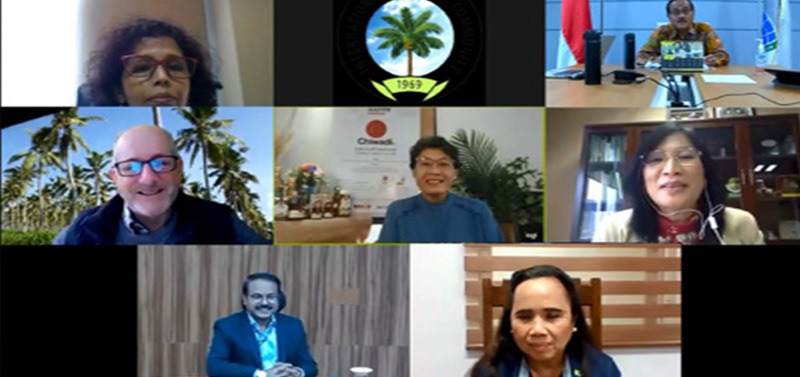On 6th October 2020, the International Coconut Community (ICC) in collaboration with the Non-Aligned Movement Centre for South-South Technical Cooperation (NAM-CSSTC) conducted the second Online Training Program with the theme “Processing and Marketing of Coconut Sugar”. More than 350 people from 20 countries took part in the training. The participants were from the ICC and NAM-CSSTC member countries in Asia, Australia, Pacific, and Africa and nonmember countries like the USA, Egypt, UK, and Saudi Arabia.
The training was under the agreement between both parties with respect to providing cooperative services to the member countries in research and development programs, capacity-building, technology transfer and webinars or workshops, under the theme of: “Stay Healthy and Productive during Covid-19 Pandemic”. This training program’s main objective was to provide the necessary guidance and technical assistance to the farmers and to provide information on the domestic and international market prospects to the SMEs.
Dr. Jelfina C. Alouw, Executive Director, ICC, in her welcome speech mentioned that in 2001-2018, the average annual growth of world sugar consumption was about 2%, mostly driven by population growth. The global coconut sugar market value was estimated at USD 1.8 billion in 2019 and was projected to grow at a compound annual growth rate of 5.5% from 2019 to 2025. Coconut sugar as one of sap-base products was growing and expanding both in the domestic and international market, it has caught many health-conscious people’s attention because of its low glycemic index, as an alternative sweetener which was beneficial for people who suffered for diabetic. A great advantage of coconut sugar production was that it could be undertaken by villagers or SMEs, including cooperatives and women.
His Excellency Ambassador, Mr. Ronny Prasetyo Yuliantoro in his opening remarks said that NAM-CSSTC has been funding 115 initiatives, and agriculture sector was associated with 9% of the total programs. By the training, NAM-CSSTC and ICC would play a crucial role in improving the technology, innovation, and competitiveness of coconut industry. This training was supposed to encourage the farmers to increase production to meet the domestic and global coconut sugar demands, while maintaining the coconut sugar business sustainability, and to mitigate the global economic impact of COVID-19.
The First speaker, Ms. Erlene C. Manohar, Deputy Administrator, Research and Development Branch, Philippine Coconut Authority, presented “Coconut Sugar Industry in the Philippines”. She explored the importance of the coconut sap sugar industry, process technology, opportunities, feasibility study, and the industry's supply value chain. She projected increasing demand for coco sap sugar due to the rising health consciousness of consumers worldwide due to the increasing number of diabetic people as possible users of the product, growing interests of consumers on natural and healthy products in the global market. Her presentation was followed by a video demonstration on the collection and processing of coconut sugar.
The second speaker, Ms. Sarapee Yuadyong, Managing Director Chiwadi Products Co., Ltd., Thailand, presented “Marketing of Coconut Sugar”. She called coconut sugar as the world most wanted sweetener due to its growing demand as a preferred sweetener from lower glycemic index than cane sugar. Besides used in tea, coffee, beverage, cosmetic industry, and herbal skin and hair care in Korea, China, and India, it’s also used as body scrubs, shaving gels, face, and body creams. The prices for the products were likely to increase owing to the surging demands in the international market.
Dr. C. Anandharamakrishnan, Director, Indian Institute of Food Processing Technology, Ministry of Food Processing Industries, India, presented “Sustainable Supply Chain of Raw Materials for Sugar Production”. He explained utilization and value addition, changing consumer preferences, coconut sugar production global trend, market-leading players, production technology, and market prospects. The challenges in the coconut sugar supply chain were raw material availability, quality, and price issues; policies for SMEs, quality consistency, resilient supply chains, digitalization and ICT application. He also addressed the sustainability strategies and future food trends.
There was an in-depth discussion on the topics, and the speakers attended the queries. The webinar was moderated by Mr. Vincent Johnson, Interim COGENT coordinator, ICC. The webinar concluded with a closing remark by Ms. Mridula Kottekate, Assistant Director, ICC.

